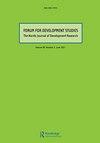Politicization of Non-state Cash Transfers: The Cases of Uganda and Tanzania
IF 1.1
Q3 DEVELOPMENT STUDIES
引用次数: 0
Abstract
Social cash transfers (CTs) have expanded considerably in Africa over the last decade. While the largest programmes are run by public institutions, non-state actors are increasingly becoming involv...非国家现金转移的政治化:乌干达和坦桑尼亚的案例
在过去十年中,非洲的社会现金转移(CTs)得到了大幅扩展。虽然最大的计划是由公共机构实施的,但非国家行为者也越来越多地参与其中。
本文章由计算机程序翻译,如有差异,请以英文原文为准。
求助全文
约1分钟内获得全文
求助全文
来源期刊

FORUM FOR DEVELOPMENT STUDIES
DEVELOPMENT STUDIES-
CiteScore
1.80
自引率
14.30%
发文量
24
期刊介绍:
Forum for Development Studies was established in 1974, and soon became the leading Norwegian journal for development research. While this position has been consolidated, Forum has gradually become an international journal, with its main constituency in the Nordic countries. The journal is owned by the Norwegian Institute of International Affairs (NUPI) and the Norwegian Association for Development Research. Forum aims to be a platform for development research broadly defined – including the social sciences, economics, history and law. All articles are double-blind peer-reviewed. In order to maintain the journal as a meeting place for different disciplines, we encourage authors to communicate across disciplinary boundaries. Contributions that limit the use of exclusive terminology and frame the questions explored in ways that are accessible to the whole range of the Journal''s readership will be given priority.
 求助内容:
求助内容: 应助结果提醒方式:
应助结果提醒方式:


